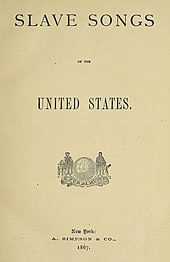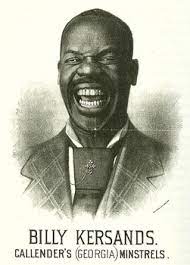Commodification of Black Music
by: Ta’Niyah Armstrong
Intro
In a society that relies heavily on Capitalism, the labor and legacies of African Americans are regularly counted out. Rooting as far as back as slavery, the commodification of black creators, and their talents is as regular occurance. To gain profits and fame, White Americans take the creations of African Americans and rebrand them as their own.

Negro Spirituals of the 1800’s
Not only did black Americans have their physical bodies claimed as property to the white man, but traditional songs were as well. Enshrouded in racism, the very beginnings of American music as we know it was birthed from oppression. In 1867, a book titled ‘100 Slave Songs of America’ or ‘Slave songs of the United States’ was published by Northern white men. The book contains 100 negro spirituals that were utilized by slaves to survive slavery. This book is still selling to this day, with none of the money going to the creators of these songs, or their families. The popularization of minstrel shows also show the commercialization of black people. Black people were made to degrade themselves for white satisfaction.

Jubilee Quartet
During the rise of the Jubilee Quartet and Fisk Jubilee singers, the commodification of black artists increased. The 1938 concert ‘Spirituals to Swing’ presented by John Hammond, is a direct example of this profitization. African American artists were used as commercialization to promote and popularize American culture.
Ragtime
During the Ragtime era for example, the popularization of sheet music was prominent. Poor musicians often had their sheet music sold to white profitors. Musicians including Scott Joplin failed to receive ample amounts of profit from these sales.The purchase of pianos led to an increase in sales, in which musicians did not receive regular payments for their musical contribution.
Jazz and Blues
In the 1940’s – 50’s the genre of Jazz and Blues were at its peak. Jazz music was loved by all as it was often very upbeat and joyful. The same however, cannot be said about Blues. Considering this genre of music emerged during Reconstruction, many African American artists sang about their sorrows, and escaping them. White Americans degraded and demonized this interpretation of Blues. As a result, many white artists copied the melodies of black songs, in an attempt to make them more digestible for white audiences.
Moreover, white owned record companies, like Chess Records, received profits from the records of black creators. Along with that, they also set standards of what black artists were expected to live up to. This included a change in not only music style, but physical presentation. Many black artists had to whitewash their styles in order to do good under these record companies. These companies signed black artists like Etta James, Muddy Waters and Chuck Berry.
21st Century Commodification
Seeing the marketability of black creation, many white Americans have taken advantage of it, and used it for their own personal profit. This is still seen regularly today. In specific, apps like TikTok perpetuate the usage of black creators content without credit. Regularly, white creators on the app use the sounds and music of Black creators, without proper credit given. More frequently, the choreography of black creators is stolen by white creators.

